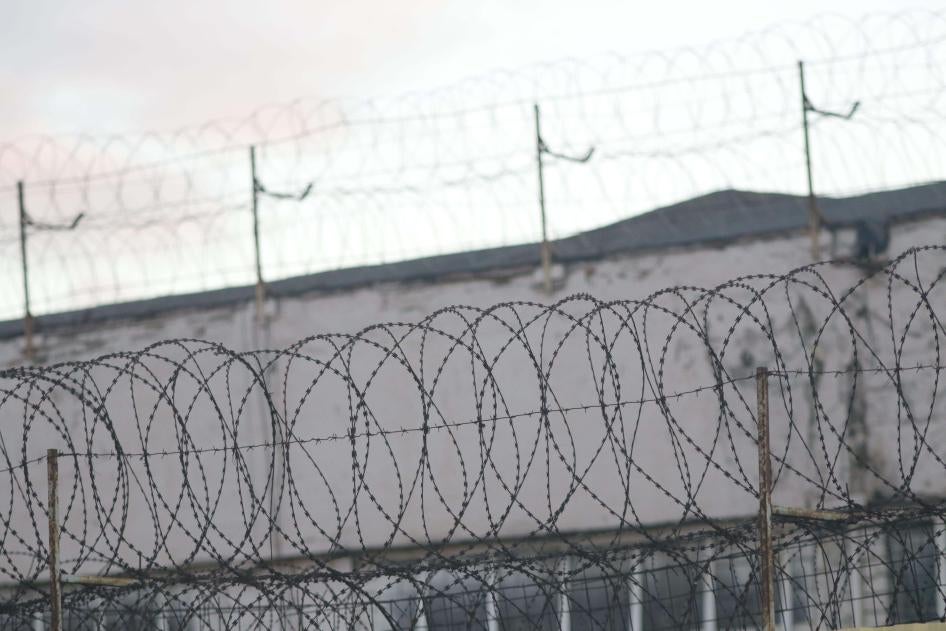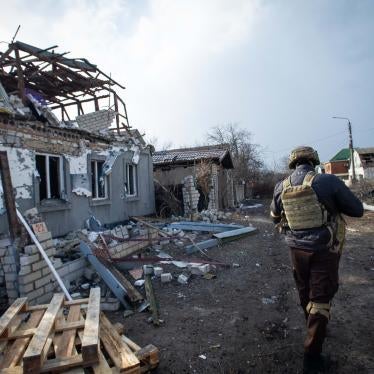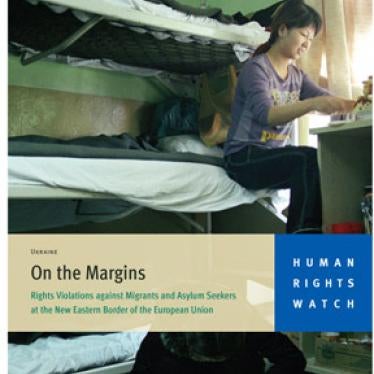(Berlin, July 14, 2022) – Russian forces in Ukraine have forcibly disappeared civilians and illegally transferred them to Russia, Human Rights Watch said today. Human Rights Watch documented the detention of nine civilian men by Russian forces while they occupied Ukraine’s Kyiv region, and their apparent transfer to detention facilities in Russia’s Kursk and Bryansk regions when the forces rotated out or withdrew.
The family and friends of the men told Human Rights Watch that those being detained are civilians, which means they should be treated as “protected persons,” not prisoners of war (POWs), under the Geneva Conventions applicable to the armed conflict in Ukraine. They said they learned about the men’s locations from former prisoners who had shared cells or had otherwise seen them in Russian facilities. Russian violations committed against these detainees include possible unlawful confinement and hostage-taking, unlawful transfer or deportation, and enforced disappearances, which may amount to or involve multiple war crimes.
“Russian forces unlawfully transferred these civilians to Russia, forcibly disappeared them, and continue to hold them without providing information or access to their families,” said Tanya Lokshina, associate Europe and Central Asia director at Human Rights Watch. “Russian authorities should immediately release and return all Ukrainian civilians detained in Russia and ensure that everyone in their custody who was detained in or from Ukraine, combatant or civilian, is officially registered with the International Committee of the Red Cross (ICRC).”
In a June report, the United Nations Human Rights Monitoring Mission in Ukraine said that it had documented hundreds of cases of arbitrary detention by Russian forces in areas they, or affiliated armed groups, control in Ukraine. The report that said many were subjected to torture and other ill-treatment and that and “an unknown number of victims were transferred to territory of the Russian Federation …” among other locations, where they were “held in penal institutions, often together with prisoners of war.”
Artur Prihno of Media Initiative for Human Rights (MIHR), a Ukrainian nongovernmental human rights group, told Human Rights Watch that after Russian forces detained civilians in Ukraine, they transferred them to a camp in Naroulia, Belarus and, between 3 and 10 days later, took them to Russia. Some of what families have learned about their missing relatives suggests that Russian authorities may be treating the civilians as POWs, and at a minimum are detaining them with POWs. Ukrainian authorities dealing with POWs have also informed relevant families that they received information that five of the men – Bohdan Shcherba, Ramiz Musaev, Roman Kissel, Vasyl Volokhin, and Serhii Liubich – are in detention in Russia.
Two lawyers who attempted to visit detention facilities in Kursk and the town of Novozybkov in Bryansk told Human Rights Watch that the authorities refused to grant them access, acknowledge the detention, or disclose detainees’ whereabouts. One lawyer said his team tried at least five times to access both detention facilities, most recently in mid-June. Relatives also sent written requests for information about their loved ones to both detention facilities and received replies that the men were not there. This amounts to enforced disappearance, a crime under international human rights law in all circumstances.
International humanitarian law prohibits individual or mass forcible transfers of civilians from occupied territory to the territory of the occupying power, which can constitute a war crime. International humanitarian law also prohibits hostage-taking. Detaining civilians for the purpose of using them in future prisoner exchanges would constitute the war crime of hostage-taking.
The June UN report described “credible reports of torture and other forms of inhuman treatment of prisoners of war interned both in territory of the Russian Federation and territory controlled by Russian-affiliated armed groups [in Ukraine],” including in the Kursk pretrial detention facility.
“Ukrainian civilians detained by Russian forces not only lose their liberty, but also face a serious risk to their health and lives by being held without legal or public oversight,” Lokshina said. “Russian authorities should immediately reveal the whereabouts of and free all Ukrainian civilians in their custody, detained in formerly or currently occupied areas.”
People ‘Disappeared’
All nine men whose families or friends Human Rights Watch interviewed were detained between February 26 and March 18 in the Kyiv region: five from the Bucha district, two from Hostomel, and one each from the town Dymer and the village of Dorohynka.
Sent to Kursk
Six of the men whose relatives or friends spoke with Human Rights Watch were transferred to Kursk. These include Bohdan Shcherba, 31, his brother-in-law; Ramiz Musaev, 24; and their friend, Roman Kissel, 30. On February 26, Russian soldiers detained the three men while they were driving from Lubianka, a village near Bucha, to the neighboring village of Ozera.
Shcherba’s wife recognized him and Kissel in a video a Russian TV channel released in March, claiming to show Ukrainian captives in Hostomel. Two weeks later, Shcherba’s colleague found his undamaged car abandoned on the road with the doors and trunk open and license plates missing.
A friend of Ivan Remez told Human Rights Watch that Russian forces detained Remez, 31, in Hostomel when he was riding his bicycle delivering humanitarian aid to older people on March 6. The friend said she had spoken with two released POWs who said they saw Remez while in Kursk pretrial detention center no. 1.
On March 5, Russian soldiers in Hostomel detained 25-year-old Mykola Smagliuk and another man whose name is withheld for his safety, who had left their shelter to take out trash. Smagliuk’s relative told Human Rights Watch that she spoke with the other man after he was released from detention in Kursk. He told her that on the day they were detained, soldiers had ordered them to drop to the ground and crawl toward the soldiers’ armored personnel carrier. He said he and Smagliuk were held together on a military base in Hostomel for several days but were transferred separately to Russia, with the other man arriving at the Kursk detention facility several days before Smagliuk.
The families of Shcherba, Musaev, Kissel, Remez, and Smagliuk said that they had been in contact with former cellmates of each of the five men in Kursk pretrial detention facility no. 1. The former cellmates said that in mid-April, Shcherba, Musaev, and Kissel were transferred to a women’s penal colony no. 11 in Kursk region.
The family of Danylo Kuptsov, 26, told Human Rights Watch that Russian forces detained him in Dorohynka, in the Kyiv region, on March 11, while he was trying to charge his phone in his car. About a month later, his family learned from a former cellmate that Kuptsov was being held in the Kursk pretrial detention facility. In April, Kuptsov’s wife tried to contact the facility but was told that Kuptsov was not there. On May 13, the ICRC informed the family that Kuptsov was in custody in Russia.
In June, Human Rights Watch documented the enforced disappearance of Viktoria Andrusha, a Ukrainian teacher detained by Russian forces in Chernihiv region and forcibly transferred to Kursk.
Transferred to Bryansk Region
Human Rights Watch spoke with the families of three men whom Russian forces forcibly transferred to the Bryansk region. They, in turn, had spoken with people who had been their loved ones’ cellmates and other witnesses to their detention. Anna, a resident of Dymer, whose family name is withheld at her request, said that on March 4, Russian soldiers detained her 33-year-old brother, Vasyl Volokhin, when he was cycling across Dymer to warn the residents about an upcoming rocket attack about which he had obtained information. Witnesses told his family that Russian soldiers shot and injured him. His damaged bicycle and phone were found on the road.
Russian soldiers in Bucha detained Evhen Guryanov, 45, after raiding his house and interrogating his family on March 18. Natalia, Guryanov’s wife, said she was there when he was detained. She also said that on March 7, Russian soldiers detained her brother-in-law, Serhii Liubich, 37, as he was transporting drinking water from Bucha to Hostomel. Witnesses told her that soldiers put a bag over his head and took him away.
Natalia said that several former prisoners from correctional facility no. 2 (IK-2, in Russian) in Novozybkov, Bryansk region, confirmed they saw Guryanov and Liubich there. Eventually, a man passed a message to Volokhin’s family, through an intermediary, that he had been Volokhin's cellmate in Bryansk region. When the family sent Volokhin a letter in mid-March, IK-2 authorities responded with a notice that “the message has been delivered to the addressee,” and then with another response that “this person does not exist.” Volokhin’s family believes he remains in IK-2.
Ill-Treatment
Following their release and return to Ukraine by way of prisoners’ exchanges, former prisoners, both civilians and combatants, told rights groups and mass media about humiliating and degrading treatment and torture they endured in Russian captivity in Ukraine and Russia.
MIHR reported that the authorities in the Kursk and Novozybkov detention centers forced captives to wear a prison uniform and cut their hair short, including women. One of the former prisoners with whom a detainee’s family member spoke said inmates were repeatedly interrogated, regularly beaten, and given electroshocks, as well as forced to stand for extended periods of time. MIHR documented a case in Kursk pretrial detention facility no. 1 in which a detainee witnessed guards beating a civilian detainee to death.
The authorities also subjected some of the detainees to psychological pressure, forcing them to learn the Russian anthem by heart and sign documents without being allowed to read them, MIHR staff told Human Rights Watch.
One family member said that her neighbor, who returned to Ukraine after having been held in a Russian prison, had to have his leg amputated due to lack of medical treatment for frostbite in prison. Other men reported similar stories to the media.
International Law
The laws of war allow a warring party in an international armed conflict to detain combatants as POWs and to intern civilians in noncriminal detention if their activities pose a serious threat to the security of the detaining authority. The Fourth Geneva Convention on civilian protection sets out procedures and safeguards around internment, and any interned civilian must be released as soon as the reasons that necessitated their internment no longer exist.
Civilian detainees cannot be transferred from occupied territory to that of the detaining party or its allies. Article 49 (1) of the Fourth Geneva Convention is explicit in its prohibition of “individual or mass forcible transfers, as well as deportations of protected persons from occupied territory to the territory of the Occupying Power or to that of any other country … regardless of their motive.” This is a grave breach of the Geneva Conventions (see article 85 (4) (a) of Additional Protocol I) and a war crime under the ICC Rome statute (article 8 (2) (b) (viii)).
If a person is detained not as a civilian but as a combatant, they are to be afforded POW status and are entitled to all the protections afforded POWs, in particular those set out in the Third Geneva Convention. The ICRC should be informed of all POWs, allowed to visit them and to transmit information about them to their families.
During an armed conflict, when part of an attack against the civilian population, failure to acknowledge a civilian’s detention or to disclose their whereabouts in custody with the intention of removing them from the protection of the law for a prolonged period constitutes the crime of enforced disappearance and is prosecutable as a crime against humanity under the International Criminal Court’s statute (article 7(1) (i)).
No detained person, whether POW or civilian, should be held outside of the protection of the law, but should be formally registered and information regarding their detention, including their whereabouts, should be accessible and provided to their families and all relevant authorities. All detainees are protected by due process obligations under international law.
Taking hostages is a grave breach of the Fourth Geneva Convention and a war crime, including under the Statute of the International Criminal Court (article 8 (2) (a) (viii)). Hostage-taking includes detaining a person with an explicit or implicit threat to continue to detain the hostage as leverage to compel a third party to undertake a particular act to secure the hostage’s release.







